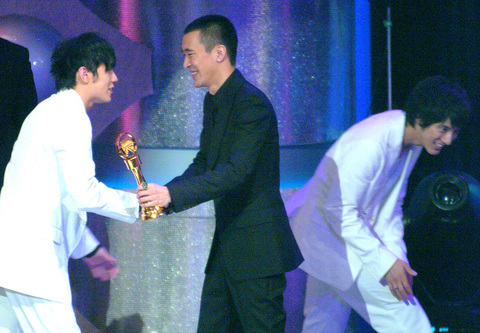The 16th Golden Melody Awards made many happy faces last Saturday with glittering stars holding up their newly secured best-something titles, waving and laughing out of sheer excitement on the stage. However, there is always something bound to go wrong at every big party, and this year's biggest embarrassment award would unanimously go to musician Wang Lee-hom (王力宏), who mistakenly went up to the stage for the honor of Best Male Mandarin Singer, which was in fact given to Stanley Huang (黃立行).
When an award presenter Karen Mok (
Mok felt terrible about the mistake she made and was too embarrassed to go to the party afterwards. Though the Hong Kong beauty is guilty as charged, "Huang" and "Wang" do have the same pronunciation in Cantonese.

PHOTO: TAIPEI TIMES
Little S was the gossip rags' cover story again, this time with the news of her engagement to wed her 35-year-old boyfriend, Mike Hsu (
Her sister, Big S, on the contrary, has been going through a rocky time lately. Big S and her sweetheart of four years, Lan Zheng-long (
Shocking news on pop diva Faye Wang (王菲) broke out last Friday in Beijing, when her agent reportedly said that the superstar will take an indefinite leave from show biz. The Great Daily News (大成報) tried to confirm with her agent. The agent, however, promised that Wang would only take one-year vacation to enjoy her personal life for a while. And she won't completely disappear from the public view; fans will see her in a couple of upcoming TV commercials while she's gone, the agent said.

PHOTO: TAIPEI TIMES

PHOTO: TAIPEI TIMES

In the March 9 edition of the Taipei Times a piece by Ninon Godefroy ran with the headine “The quiet, gentle rhythm of Taiwan.” It started with the line “Taiwan is a small, humble place. There is no Eiffel Tower, no pyramids — no singular attraction that draws the world’s attention.” I laughed out loud at that. This was out of no disrespect for the author or the piece, which made some interesting analogies and good points about how both Din Tai Fung’s and Taiwan Semiconductor Manufacturing Co’s (TSMC, 台積電) meticulous attention to detail and quality are not quite up to

April 28 to May 4 During the Japanese colonial era, a city’s “first” high school typically served Japanese students, while Taiwanese attended the “second” high school. Only in Taichung was this reversed. That’s because when Taichung First High School opened its doors on May 1, 1915 to serve Taiwanese students who were previously barred from secondary education, it was the only high school in town. Former principal Hideo Azukisawa threatened to quit when the government in 1922 attempted to transfer the “first” designation to a new local high school for Japanese students, leading to this unusual situation. Prior to the Taichung First

Chinese Nationalist Party (KMT) Chairman Eric Chu (朱立倫) hatched a bold plan to charge forward and seize the initiative when he held a protest in front of the Taipei City Prosecutors’ Office. Though risky, because illegal, its success would help tackle at least six problems facing both himself and the KMT. What he did not see coming was Taipei Mayor Chiang Wan-an (將萬安) tripping him up out of the gate. In spite of Chu being the most consequential and successful KMT chairman since the early 2010s — arguably saving the party from financial ruin and restoring its electoral viability —

The Ministry of Education last month proposed a nationwide ban on mobile devices in schools, aiming to curb concerns over student phone addiction. Under the revised regulation, which will take effect in August, teachers and schools will be required to collect mobile devices — including phones, laptops and wearables devices — for safekeeping during school hours, unless they are being used for educational purposes. For Chang Fong-ching (張鳳琴), the ban will have a positive impact. “It’s a good move,” says the professor in the department of